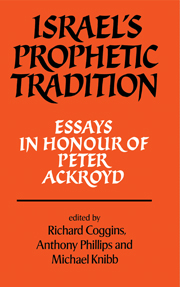Book contents
- Frontmatter
- Contents
- Preface
- Biographical note
- Abbreviations
- Note
- Prophecy in the ancient Near East
- The origins of prophecy in Israel
- Three classical prophets: Amos, Hosea and Micah
- The Isaiah tradition
- An alternative prophetic tradition?
- Visionary experience in Jeremiah
- The Ezekiel tradition: prophecy in a time of crisis
- The prophets of the restoration
- Prophecy and the emergence of the Jewish apocalypses
- Prophecy and wisdom
- Prophecy and the cult
- Prophecy and law
- A change of emphasis in the study of the prophets
- Martin Buber and the interpretation of the prophets
- Index of Biblical References
Preface
Published online by Cambridge University Press: 09 January 2010
- Frontmatter
- Contents
- Preface
- Biographical note
- Abbreviations
- Note
- Prophecy in the ancient Near East
- The origins of prophecy in Israel
- Three classical prophets: Amos, Hosea and Micah
- The Isaiah tradition
- An alternative prophetic tradition?
- Visionary experience in Jeremiah
- The Ezekiel tradition: prophecy in a time of crisis
- The prophets of the restoration
- Prophecy and the emergence of the Jewish apocalypses
- Prophecy and wisdom
- Prophecy and the cult
- Prophecy and law
- A change of emphasis in the study of the prophets
- Martin Buber and the interpretation of the prophets
- Index of Biblical References
Summary
Scholarly advance in the humanities often depends less upon sensational new discoveries than upon the questioning and re-evaluation of what had become unquestioned assumptions, and it is in this latter area that Peter Ackroyd's especial contribution to Old Testament scholarship will probably be judged to rest. From his doctoral thesis on the proper criteria for Maccabean dating of the Psalms, through his questioning of the accepted view of the exile and restoration and his dominant role in bringing about a fresh evaluation of the achievement of the Chronicler, he has insisted on asking the awkward questions and has perceived that the underlying truth is always liable to be more complex than is allowed for by any neat generalisation. The range of his Old Testament interests is amply demonstrated by the bibliography of his published works included in this volume; the one gap is that he has not yet had opportunity to write a major commentary, and his many friends will hope that his retirement will provide such an opportunity. The Torch commentary on Chronicles-Ezra-Nehemiah and the Cambridge pair on 1 and 2 Samuel give some indication of the riches that might be expected.
The world of Old Testament scholarship at large will make its own assessment of Peter Ackroyd's achievement; the present editors owe him a further debt as teacher and colleague. It is a recurring source of amused satisfaction to observe undergraduate students, at first bewildered by the way in which his lectures make them question their simple certainties, gradually being led to see depths they had not previously imagined.
- Type
- Chapter
- Information
- Israel's Prophetic TraditionEssays in Honour of Peter R. Ackroyd, pp. vii - xPublisher: Cambridge University PressPrint publication year: 1982



